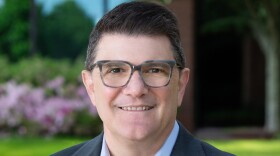The state’s most conservative lawmakers have for years formed the House Freedom Caucus, and now there’s a similar caucus for legislators on the left.
The House Progressive Caucus formed this year and has about a dozen members, as well as a political action committee that will be involved in legislative elections next year.
“We kind of complement the larger (Democratic) caucus, but we have the ability to go a little more progressive than some of the other Democrats are comfortable with,” said Rep. Marcia Morey, D-Durham, one of the organizers of the caucus.
Morey and another Progressive Caucus member, Rep. Pricey Harrison, D-Guilford, joined me on the WUNC Politics Podcast this week to discuss their efforts.
They recognize that getting their preferred policies passed under a Republican near-supermajority is unlikely, but they measure success in other ways.
The Progressive Caucus PAC will be raising money to help Democratic candidates, but Morey stressed that it won’t be involved in efforts to primary incumbent Democrats.
"I think we can help the second tier of candidates that aren't the prime ones for the regular caucus — boost them, give them advice, mentor them, give them a little bit of money that they otherwise wouldn't have," she said.
Morey and Harrison also shared their thoughts on the legislature’s budget impacts, as well as examples of policy wins that sometimes involved work with GOP colleagues.
This conversation has been lightly edited for brevity and clarity.
Given the Republican near-supermajorities that make it hard for Democrats of any stripe to get bills through, where do you see the Progressive Caucus making a difference on the policy front?
Harrison: "I think we're working across the aisle to make bad bills less bad, which I think is kind of an achievement in this era. There's a lot of just educating our colleagues on issues, and speaking up in caucus about certain aspects of the proposed legislation that they may not be aware of. I think we're there as a force, kind of like the opposite of the Freedom Caucus: similarly structured, but a liberal bent, obviously."
Are there other issues where you think the Progressive Caucus may take a different stance than other House Democrats?
Morey: "I think one big issue was the immigration (bills). I think we stood together. We tried to give some amendments, but I think there were others in the main Democratic caucus who saw things a little bit differently."
Harrison: "Another one would be the REINS Act that was going to significantly overhaul the way that the governor's administration could actually protect us through the various agencies. Our caucus was strong on the debate in committee and on the floor, and I feel like it raised issues that people might have thought, 'oh, this is just a way to rein in bureaucracy,' but it isn't."
With the primaries that you might get involved in, are you looking more towards districts where it's a safe blue district, and do you elect someone who's more of a centrist or someone who has more progressive values?
Harrison: "I don't think we've nailed that down yet, because we're still recruiting, and the filing starts in December. But I think that's a good angle. And the other ones are just those who are in districts that the larger caucus won't be targeting — but we find are still competitive, like a district in Forsyth County or Pitt County."
Is there any role for Democrats or progressive lawmakers at this stage of the budget process?
"We have great social media going, and we're trying to shine a light so people understand what is happening in Raleigh: how it impacts them, and have a rapid response to issues that come up, and not just sit and wait for a press conference a month down the road. People need to understand our side of it, and we need to be pretty bold and vocal about it."







